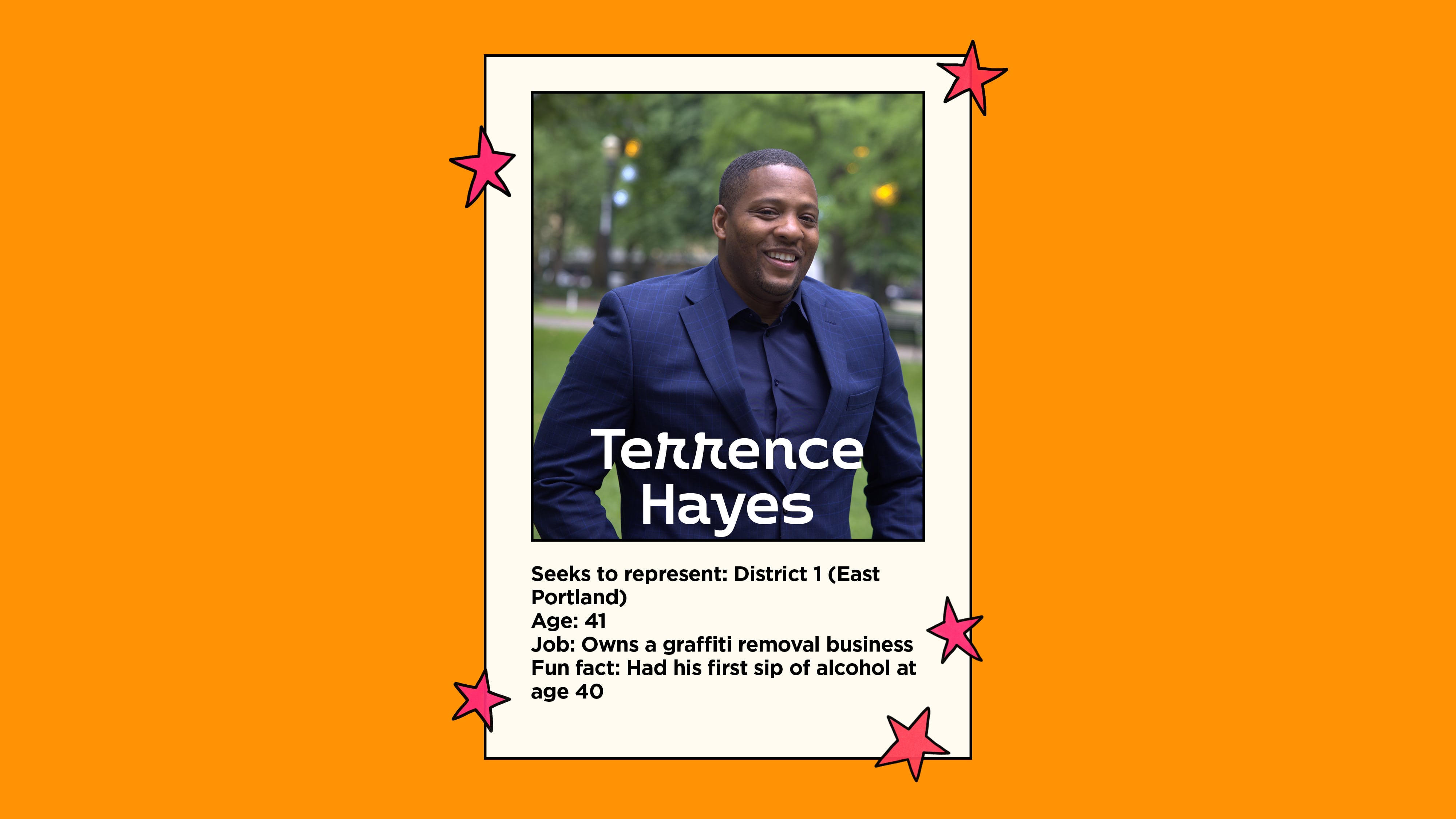- Seeks to represent: District 1 (East Portland)
- Age: 41
- Job: Owns a graffiti removal business
- Fun fact: Had his first sip of alcohol at age 40
Here’s an item you won’t find on just any candidate’s résumé: Terrence Hayes spent 13 years in prison at the Snake River Correctional Institution in Eastern Oregon for attempted murder.
He says that’s part of the experience that qualifies him to represent a portion of the city plagued by shootings.
In 2004, following his freshman year at Western Oregon University, Hayes, who was in a gang, was shot and injured at a strip club. He says that after the shooting, he so badly wanted out of gang life that he didn’t even own a gun. But a few months later, Hayes says, he was with a friend and saw a man who he believed played a part in shooting him. Hayes’ friend had a firearm and offered it to Hayes, who shot the man out of “fear, trauma and anger,” he says.
After his release from Snake River, Hayes worked as an electrician for four years before starting a graffiti removal business with his wife. They employ formerly incarcerated Black people. “I focus on them very specifically because there’s a wage gap in communities of color,” he says. “We have to help people make enough money to provide for themselves in their family.”
Now, Hayes is running to represent East Portland on the 12-member Portland City Council. This is the first time he’s run for office, but he’s sat on the state’s Criminal Justice Commission and the Racial Justice Council. He was executive director of Liberation Literacy, an organization that went into prisons and taught social and restorative justice literacy to inmates.
He was a cousin of Quanice Hayes, who in 2017 was shot and killed by a Portland Police officer. His death sparked protests across Portland, and a grand jury declined to indict the officer, Andrew Hearst, who killed him. In 2021, the city agreed to a $2.1 million settlement with Hayes’ family.
Yet Hayes is a staunch supporter of Portland’s police force and is the only East Portland candidate the police union has endorsed.
WW spoke to Hayes about his candidacy. The interview has been edited for clarity and brevity.
WW: What are your top three priorities if elected?
Terrence Hayes: Public safety. For me, that’s making sure we have best practice in our police force and police accountability. We have to make sure that we have due process. I believe we have to reconcile the relationship between police and community.
And then, cleanliness. We need to increase our investments to remove graffiti and clean our streets, probably by 30%.
And affordability. It’s not simply about affordable homes. I think we need to reimagine investing in our young people to get them back into the trades and create paths to entrepreneurship. I want to focus on a path where the next generation can afford to live on their own without subsidy.
What aspects of the city’s current approach to drug use and overdose deaths do you support, and what would you change?
We aren’t strategic enough. We should be focused on having places where people can sober up, and having treatment centers. I think Measure 110′s failure is about people’s failure, not about the heart of that measure. We should’ve been more strategic, and it exposed leadership’s inability to execute on behalf of people who are struggling with drug addiction. I would’ve taken some of the academic voices out of it and put in real people with real experiences.
Do you support the city staying in the Joint Office of Homeless Services? What’s your plan to address homelessness?
I do support it. We need to take a bigger role because every time it doesn’t work out, we blame Multnomah County, but then we kind of let them lead the way, so it’s a bit hypocritical. What I would do is have two at least 150-capacity, 24-hour shelters in every district. If we provide a safe place for people to come rest during the night, it won’t only make them safer, but it will make the city safer.
Would you change the Portland Clean Energy Fund and, if so, how?
I don’t know how much I would poke at PCEF. One thing I would challenge them to do is to create easier pathways for people to access the money. It’s become too political, in my opinion, and they have a very specific job to do.
Which current City Council member do you most align with?
I’m going to be honest, I probably align closer to Commissioner Rene Gonzalez. The reason I say that is because I like someone who has a clear path of what we should be doing. It doesn’t mean we agree on everything, but we have to at least be in agreement that something has to be done. He’s the only one that’s willing to make hard stances and say we need to do something now.
Is the city doing enough to bring back downtown and economic development? If not, what should it be doing that it’s not?
What we’re doing wrong is, we refuse to accept that our city is changing. We keep acting like homelessness is why people don’t come downtown, and I disagree with that. When COVID-19 happened and people realized that they can do their job from home, I just don’t think they’re in a rush to come back. What I pitched is that they reimagine what office space looks like and what it can be used for downtown. We have to imagine that it might be musicians, hippies and artists that walk into those buildings and not people in suits and ties.
How do you want police to respond to the riots in November if Trump wins?
We have to clearly communicate that protesting in downtown Portland is not going to change anything that’s happening in that White House. We have to guarantee that we won’t allow that leadership in Washington, D.C., to change our narrative in Portland, Oregon. That being said, we can’t destroy our city. You don’t get to destroy property and get mad when police act like police. If it is peaceful, the police have to stay out of the way. But when we start breaking windows, we have to have the expectation that police are going to step in.
How do you plan to win this election?
I think my message on public safety will resonate in East Portland more than any part of our city. I think my second-chance story will resonate with these folks. I think when it’s time to talk about policy and initiatives, I’ll stand out because I understand what’s important to that community because I live in it.
See the other Portland City Council Candidates here!
 This article is part of Willamette Week’s Ballot Buddy, our special 2024 election coverage. Read more Ballot Buddy here.
This article is part of Willamette Week’s Ballot Buddy, our special 2024 election coverage. Read more Ballot Buddy here.

